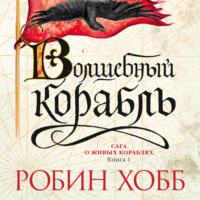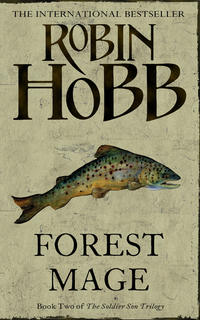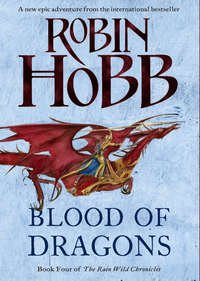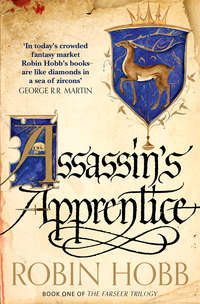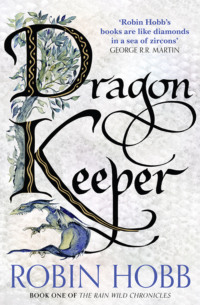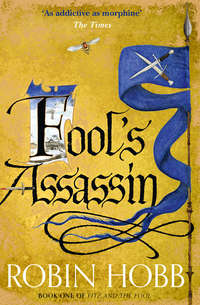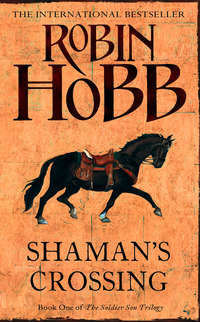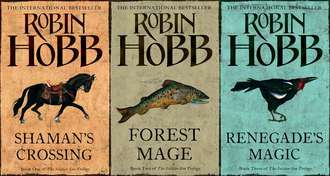
Полная версия
The Complete Soldier Son Trilogy: Shaman’s Crossing, Forest Mage, Renegade’s Magic
Then, as I watched, a bronze path, no wider than the blade of the swanneck, flowed from the embedded weapon to the top of the first hoodoo. Like an unfurling ribbon, the tongue of shimmering metal reached out across the void until it touched the first hoodoo. It was not a wide bridge, but it spanned it. I thrust my cavalla sabre into my belt, spread my arms for balance, and stepped out onto the bronze path.
Almost immediately, I lost my footing. The sword in my belt suddenly seemed to weigh as much as an anvil. I wrenched my whole body against the drag, started to topple the other way, and responded by sprinting forward along the length toward the hoodoo. Its top was slightly rounded, like a very large bed-knob. A gritty layer of sand coated the capstone and I skidded in it and fell to my knees as I tried to stop, halting less than an arm’s length from the edge. For an instant I crouched there, catching my breath and calming my heart. Grinning foolishly at my near mishap, I glanced back at Dewara. He was unimpressed. Impatiently, he gestured me on.
The scant layer of sand crunched under my feet as I stood. I looked down at the footbridge that awaited me. It was narrow and insubstantial. Bits of brightly painted pottery floated in a net of spider web. At my feet, three hawk feathers stood upright, their shafts wedged in tiny heaps of sand. The wind stirred them and they swayed. Gossamer threads reached from these foolish anchors to the footbridge that spanned the gap. I did not think a mouse could safely cross such a frail construction, let alone a man. I looked again to Dewara for guidance. He opened one wing wide and pointed at a gap in his flight feathers. This magic belonged to him, then. He obviously had full faith in it, for he flapped his arms at me, shooing me on. Later, it would seem foolhardy to me, but at the moment, I felt I had no choice. I stepped out onto the bridge. It gave beneath me, sagging so that my foot sank, just as if I had stepped out onto netting. It was the weight of my iron, I knew, that burdened the bridge. On my next step, it sagged even more, and swayed. It was like trying to walk across an insubstantial hammock that was decorated with shards of ceramic and stretched beneath my weight. Yet even that does not describe it at all. I suppose it was an experience of that world, and thus untranslatable to this one.
There was nothing certain about my footing. The bits of pottery sank unevenly beneath me and the bridge swayed with every step I took. Sometimes I sank so deeply that I had to lift my foot unnaturally high to step to the next stone, as if I were climbing a very steep stair. The pottery fragments that floored the path were marked with distinctive patterns that I had never seen before. Some of them were fire-blackened, as if from much use. Sometimes I sank almost waist deep in the netted path so that I had to wallow onto the next section of trail, which in turn sank under me. It was more exhausting than breaking trail in deep wet snow, and yet I pushed on, for I could not turn around and go back. It was a narrow way, and to either side, the bottomless chasm yawned. Once, panting, I rested and looked down. I had thought to see a river carving its way amongst those natural monuments. Instead, the spiral stone pillars seemed to descend endlessly into a shadowy distance. If I fell, I might die of starvation before my bones were ever shattered by the impact. I shook my head at that thought, and forced myself to go on.
After a long struggle, I reached the second hoodoo of turned blue stone. I dragged myself up from the path onto the rounded top of the spire and lay there, catching my breath. When I looked back, I was shocked to find I had come a very short way. Dewara stood on the cliffs, staring at me, his hawk’s beak ajar. He shifted from foot to foot uncertainly.
‘The path seems difficult but sound.’ I said the words first and the air swallowed them. Then I shouted them, and saw Dewara cock his head, as if he knew I had spoken but could not hear my voice. And yet it did not seem he was that far away from me.
Slowly I got to my feet. I was not rested yet I felt driven to go on, as if I only had a certain amount of time in which to accomplish my task. I eyed the new section of trail before me. Fine threads, braided and interwoven, made a softly gleaming trail. I knelt and touched it. Hair. Human hair, I judged, in every shade from blackest ebony to pale gold. I patted it with my hand. It seemed sound. I rose and again stepped from the dome of stone onto the strange floating pathway. I walked out feeling relieved at the sturdiness of this new path. But three steps from the rock, it swayed beneath me as if I stood in a swing.
My sisters used to play a game with tops, trying to make one walk the length of a tautly strung ribbon. I was the top, and the ribbon I traversed was not taut. The farther I went from the rock spire, the more it sagged beneath my weight. I drew my sword and gripped it, holding it horizontally with both hands as if it were a balance pole. Briefly it made a small improvement. Then the bridge began to swing, like the lazy swinging of a girl’s jump rope. I felt sick with dizziness, but pressed on, now edging upward on the sag of matted hair. Behind me, Dewara shouted something, but his words seemed distant and I dared not look back at him.
When I reached the third pinnacle of stone, I clawed my way onto it and sat down to catch my breath. I glanced back at Dewara then, but he had sunk his hawk’s head down upon his hunched shoulders and perched motionless on the edge of the chasm. I could read nothing in his bird’s eyes, and his arms were clapped to his sides. There was no help or advice for me there.
I looked to the next hoodoo. A longer path separated it than the three I had trodden. That next resting place looked smaller, too, and even more rounded. The path to it was an interlocking web of plants. Tiny white flowers, smaller than my smallest fingernail, blossomed thickly on the matted vines. Suspicious, I pushed hard on it with my hand before venturing forth. The tough roots held. When I poked at them with my sword, they browned and shrivelled away. That would not do. I had no desire to weaken the path by killing the plants. I placed my sabre once again through my belt. This path was wider, also, and the roots of the plants seemed anchored to the pillar on which I stood, reminding me of ivy climbing up the trunks of trees and the walls of houses.
I set out across the path more boldly than I had the previous two. It bore me up firmly and although the plants and their tough vines crunched underfoot as I stepped on them, it did not sway nor give beneath my stride. The fragrance of the crushed flowers and foliage was oddly pungent, but surely a smell could not harm me. I was halfway across before my hands burst into tiny white blisters. They itched painfully and I longed to scratch them. Even clutching my hands into fists caused the tiny blisters to burst. The liquid that flowed from them seared my skin, and left a second crop of white blisters in its wake. I held my hands away from my body and tried to ignore the searing pain. How grateful I was that I wore boots and not the low, soft shoes of a plainsman. If the plants had affected my feet, I do not think I could have gone on. As it was, my eyes began to burn and my nose to run. It took stern discipline to keep my hands away from my face. I stumbled on, and when I reached the next stone support, I found it as small as it had appeared. I stepped away from the loathsome plants and perched on a hoodoo cap no larger than a dinner platter.
Almost as soon as I had stepped onto the stone cap, my agonies ceased. The sores on my hands ceased burning. I still dared not touch my face, but when I turned my face to my shoulder and rubbed my streaming eyes on my upper arm, my symptoms began to clear. I would have felt much better, had I not been perched on such a tiny island. There was not room enough to sit down and rest, and so I moved on.
The next bridge was made of bird bones, cleverly bored and bound together with fine thread ligaments. Occasional beads of shell or polished stone glittered in the network. Perhaps they had been bracelets or necklaces before they had been re-wrought into a suspension bridge. The tiny bones clicked together as I ventured over them. Despite the fragility of the fine white bones, none of them gave way beneath me, nor did the bridge sway or give to my weight. Only the rising wind gave me pause as it tugged at my clothing and whispered past my ears. The wind carried a strange and distant music. I paused to listen to it. The distant whistling of flutes and rattle of bone castanets marked it as Kidona music. It was foreign to me and yet I sensed its significance. I looked down at the bridge beneath my feet and suddenly knew the bird bones were parts of a musical instrument. The music sang to me in a language I almost knew. I stood still, trying to comprehend its meaning. I think if I had truly been a plainsman, it would have been more compelling in its efforts to lull me. As it was, I was able to shake off its influence and walk on. I completed that leg of the journey, reaching a much larger pinnacle of stone.
This refuge was as generous as the last one had been mean; I could have stretched out and slept upon it with no fear of tumbling off. The very temptation to do so warned me against it. I had finally sensed something about the bridges that I should have suspected all along. This pathway was not for me. Dewara had done all he could to make me think like a Kidona, but I was not truly Kidona. I traversed stretches of meaning that eluded me. I suspected there was great significance to each crossing, symbolism and subtext that did not reach my Gernian soul. For some reason, that made me feel diminished and ashamed, like an uneducated man unable to comprehend the cultural significance of a lovely poem. I did not even understand the full significance of the challenges I faced, and thus they did not truly challenge me. Chastened, I did not even glance back at Dewara, but crossed the capstone to where the next bridge began.
This bridge was all of ice, not the solid ice of a frozen pond in the dead of winter, but the fantastic ice that festoons glass into a garden of fern fronds. It seemed no thicker than window glass, and I could see through it into the deep blue distance below me. I was only a few steps out onto it before the cold bit deeply into my bones. I listened for the sound of running cracks. I shivered as I went, and my footing was slippery and uncertain. Memories not my own shivered around me. There had been a time of great hardship, a time when the old and the young died, and even the strong faced desperate decisions in order to survive. Had I truly been Kidona, the heartbreak of those recollections might have driven me to my knees with weeping. But those horrors had happened to a people not my own in a distant time. I could sympathize with their sorrows, but they were not my sorrows. I walked on, past that season of heartbreak and reached the next pinnacle of respite.
Bridge after bridge, each a test of my courage, had zigzagged me slowly across the chasm. Yet as I stood facing the next bridge, I had the uneasy feeling that I had cheated, as if I had strode unchecked through a child’s hopping game. Did my lack of roots in the Kidona culture or my cold iron make me impervious to the challenges of this task? I looked back to Dewara. He perched still and distant at the beginning of the bridge. Suspicion tapped softly on my shoulder, breathed chill down my neck. Did he hope I would succeed, or was I a stalking horse for some incomprehensible plan of his foreign mind? I stood at the lip of the next bridge and doubted all he had ever told me. Nonetheless, I went on.
The next bridge was of mud brick, solid and ancient. The bridge had block walls along each side and towers at the midpoint. It was wide enough for an oxcart to traverse. It did not swing nor sway. I should have felt safe crossing it, yet the hair stood up on my head, arms and neck. Haunted. That was the word that came to me. The bridge spoke of a time when the Kidona had built things that would stand in place for generations. Dim memories of lively towns tried to reach me. I could not believe them. As I walked out onto the bridge, its ruin was revealed to me. Rain and wind had rounded the corners of the mud bricks. Cracks wandered through the walls that edged it. Time had sucked on this structure, softening and dissolving the decorative carvings that had once stood in bas-relief on its balustrades and arches. This mighty work of the Kidona people was dwindling away, one layer of red dust at a time, just as the Kidona people were dwindling away. I felt a sudden awareness of the connection. When this weakening bridge was gone, eaten by wind and rain and time, the Kidona people would also be gone, not just from this world but from my own as well.
The farther I went, the more obvious was the decay. There were gaps in the paving under my feet, and blue distance showed in the holes. I began to encounter thin runners of vine twining along the walls of the bridge. Tiny, flowering plants had found homes in the hollows of the disintegrating bricks: Their roots pried into the cracks, and their crawling foliage snaked over the Kidona bricks, obscuring them.
I walked on, into a strange dusk. When I looked back, the long afternoon seemed to linger in the distance. The sun’s warm light shone on Dewara’s crouching figure. But the light faded gently around me as I ventured on. Plant life grew thicker on the bridge. Small trees had found places to root, and tussocks of grass grew around them. I began to hear insects and to smell the fragrance of the blossoms. Less and less of the brickwork was visible; the encroaching forest had swallowed it, cloaking it with greenery and taking it over. The walkway beneath me became ropy with vines and crawling creepers. They engulfed the turrets of the bridge and reached out over my head to tangle with one another. The bridge had become a tunnel of greenery. The twilight sky and the depths below me peeked at me from irregular openings in the foliage.
At some point, I halted, feeling more than seeing that I had left the Kidona bridge behind. I now stood upon the forest that had enveloped and devoured it. It felt oddly foreign to me, as if I had left the last vestiges of a familiar world behind and now ventured into a place where I had no right to be. A pervasive sense of wrongness thrummed through me. My body as much as my mind commanded me to turn back. The passage before me radiated hostility. All of those sensations reached me through a sense I had no name for. I saw a lovely woodland path before me in the evening twilight. A cool sweet wind blew, carrying the scent of evening flowers. I could hear birdcalls in the distance.
I lifted my eyes and looked ahead. The dimming light revealed to me a grandfather tree at the end of the tunnel. The gnarled roots snaked out from that cliff’s edge and crossed what remained of the chasm to become the foundation of the path I now walked. Red flowers the size of dinner plates peeped out from the tree’s thick foliage. Butterflies played lazily about the crown of the big-leaved tree, and grass grew thick beneath it. It beckoned me as a place of peace and rest. Yet I regarded the great tree with suspicion. Was this the final guardian that Dewara had spoken about? I wondered if the sylvan serenity before me were a trap. Did it lure me to carelessness? Once I had trusted myself to the pathway of tangling roots, would it twist and tumble me into the abyss?
I looked more closely at the network of living vines and roots that would be the final link in my trail. Part of a skull, a yellow-brown dome of bone, protruded from the moss and vines. Beyond it, a skinny root snaked in and then out of a shattered leg bone, as if it had sucked the marrow there and gained sustenance from it. The bones were old but I took no comfort from that. Farther along the pathway, I glimpsed the corroded stump of a broken swanneck. I turned and looked back toward Dewara. He was a tiny figure at the end of a green tube. He perched on the edge of the bluff, watching me. I lifted my arm in greeting to him. He lifted his, not in response but to wave me on.
I took my sabre from my belt and held it at the ready. Some small part of me saw the innate foolishness of this. If I attacked the bridge and cut it through, would I have won? I wanted to look back at Dewara again, but I deemed that he would judge such hesitation as cowardice. Would I or would I not be Kidona? If I finished the crossing, would I have won the way for them again?
I stepped out onto the bridge of roots and tested my weight on it. It was sound. It did not sway nor creak, but held me as firmly as the brick walkway had. I moved forward in the warrior’s crouch Dewara had taught me. I kept my weight low and centred, my sword going before me.
When I was a third of the way across the living section of the bridge, the roots began to creak under me, very slightly, like straining ropes. I continued to move forward, placing each foot as securely as I could on the uneven surface of the root web and holding myself ready for the expected attack. My senses strained against their limits as I strove to be wary. The tree was the sentry, Dewara had said. I fixed my attention on it, searching it for signs of hidden attackers or unnatural activity as I eased toward it.
It did nothing.
I felt a bit foolish by the time I had traversed two-thirds of the forest bridge with absolutely no signs of hostility from the tree. I began to wonder if this were one of Dewara’s practical jokes. Usually, they were physically painful, but perhaps he simply meant to humiliate me. Or perhaps there was something about the tree that he wished me to see. I stopped watching it and studied it instead. The closer I came to it, the more immense it was. The trees I knew were the trees of the plains, bent by the constant winds. They grew very slowly, and the oldest ones I’d seen did not have a quarter of the girth of the tree before me. This tree stood straight and tall; she was thick of trunk and limb, reaching her branches wide to the nourishment of the sun. Her fallen leaves carpeted the earth below her, a thick, rich litter of humus and leaf skeletons and last year’s leaves gone brown but still recognizable. The red flowers had tall yellow stamens in their centres. When the wind puffed past them, they released their yellow pollen to drift like smoke. The wind blew some toward me; it smelled earthy and rich, but stung my eyes. I blinked to clear the pollen from my lashes, and when my watering vision cleared, a woman stood before the tree. I halted.
She was no guardian warrior! I stared at her, aghast. She was very old and very fat. She was someone’s fat old granny, save that I had never before seen a woman so corpulent. Her bright eyes were hooded with flesh and wrinkles. Both her nose and ears had grown with her years. Her lips were plumped and pursed at me as if she considered me in as much bewilderment as I did her.
I continued to stare, to try to make sense of what confronted me. Dewara wanted me to do battle with this? Her flesh girdled her arms and doubled her chin. Many rings were sunken into her plump fingers, and heavy earrings, thick with gemstones, had stretched the lobes of her ears. Her fallen bosom was enormous and rested on the rolling swell of her belly. Her hair, long and streaky grey as a horse’s mane, hung like a cloak over her shoulders and down her back. The persistent breeze toyed with its uneven ends. Her robe looked as if it had been woven from grey-green lichen. It hung nearly to the ground, tenting her immense girth, and her thick ankles and plump feet showed beneath it. She was barefoot. The sunlight breaking through the tree’s leafy canopy dappled her skin and garment with shadow.
Then she moved, and my image of her changed. When she shifted, the shadowy patterns on her skin and robe moved with her, independent of the true shadows of the leaves. Her feet, like her bare arms and face, were patterned with splotches of pigment. Even at that distance, I recognized it was neither paint nor tattoo. She was dappled, speckled with colour. It took an instant before I realized that, for the first time in my life, I was seeing a Speck.
The reality was far different from the images I had formed in my mind. I had thought a Speck would be speckled with small marks, like freckles. Instead, the colour that patterned her skin was uneven. It reminded me of the dappling of some cats, as if their stripes were left unfinished to become splotches and dots. Her dapples gave me that sense of a pattern interrupted. A dark stripe ran down her nose. Dark streaks radiated from the corners of her eyes. The backs of her hands and fingers were dark, like a cat’s sooty feet, but the colour faded on her forearms.
Entranced, I drew closer to her, almost forgetting Dewara’s warnings. My approach had become the cautious creep of the fascinated cat rather than the wary stalking of a warrior. Her face was still, her expression both serene and dignified. Now she seemed, not old, but ageless. Her face was lined but they were the kindly lines of a woman who smiled often and enjoyed life. In a woman of my own kind, I would have found her bulging flesh repulsive, but because she was a Speck, it seemed just another difference between us.
She spoke, asking in Jindobe, ‘Who approaches?’ Her expression remained grave, but her low voice was courteously neutral. It was the question that anyone might ask of a stranger approaching her door.
I halted. I wanted to answer her, but I could not remember my name. I felt that I had left it behind when I entered the Kidona world. I reminded myself that I had taken Dewara’s challenge in order to become Kidona. To become a warrior and gain Dewara’s respect, I had to defeat the enemy in front of me. Yet he had not warned me that the sentry might be an old woman. The part of me that was not Kidona felt shamed by the bare blade in my hand and my failure to reply to her courteous question. A Gernian soldier did not bear weapons against women and children. I felt a strong tug from that self, and found myself lowering my sword. I tried to be chivalrous and yet warrior-like as I said, ‘The one who brought me here calls me “soldier’s son”.’
She cocked her head to one side and smiled at me as if I were very young. Her voice rebuked me gently, as a kindly old woman might recall manners to a youngster. ‘That is not your proper name, nor any way to introduce yourself. What is the name your father gave you?’
I took a breath and found a truth I had not previously known. ‘I do not think I can say that name here. I came here to be Kidona. But as of yet, I have no name in Kidona.’ After I spoke, I felt suddenly childishly foolish, to have confided this information to my enemy. I hardened my muscles and brought my blade up to readiness again.
She seemed singularly unimpressed with my sabre. She leaned closer, and as she did so, I perceived that her loose hair was snagged on the tree’s trunk, as if binding her to it. She peered at me and I felt that she looked deep inside me. In a quiet, almost confidential voice, she informed me, ‘I see your difficulty. He thinks to use you to force his way past me. He has made you believe that you must kill me to gain a man’s respect and standing. That is not true. Killing is only killing. The respect that Kidona will give you if you kill me is real only to him. No one else believes in it, least of all you. And you don’t have to kill me to earn true respect. My blood will only buy you that fool’s regard. I will pay a high price for you to be respected by a churl. Nothing bought with blood is worth having, young man.’
I thought about what she said. They were an idealist’s words that made sense as a lofty philosophy. But on a day-to-day level, I knew that much of my world had been bought with blood. My father often spoke of that, that our soldiers, especially the cavalla officers, had ‘bought the new Gernia with their lives, made these lands ours when the soils of them were watered with the blood of our soldier sons.’
‘I don’t agree with you!’ I called out to her, and then realized I need not have spoken so loud. Somehow I had drawn much closer to her without being aware of it. I wondered if the root path had drawn me closer, unperceived by me. I glanced around but had no way to tell.


